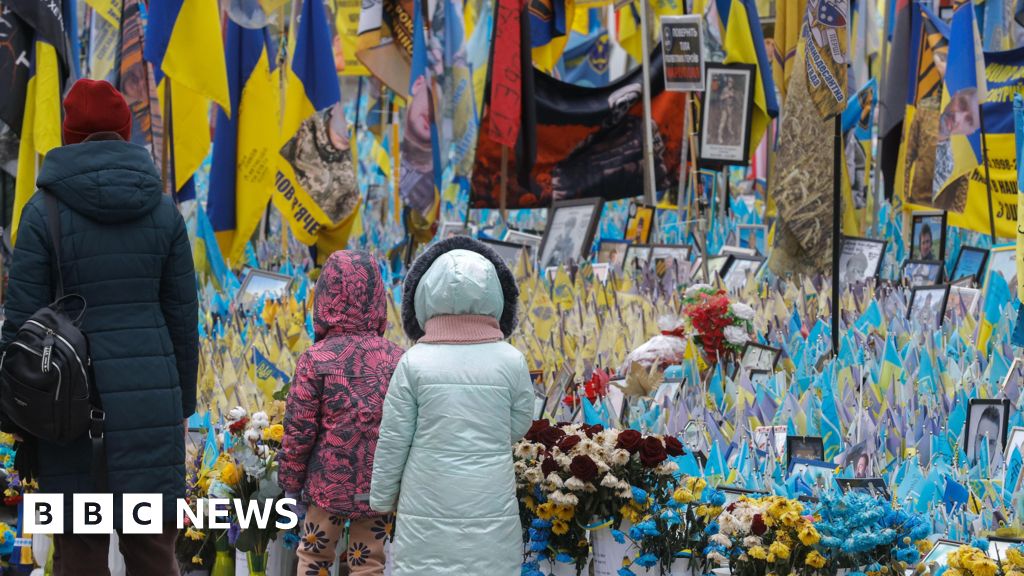Ukraine end game: What each side wants from a peace deal
- BBC News
Ukraines future is the focus of the Munich Security Conference (MSC), just days after a shock phone call between US President Donald Trump and Russian President Vladimir Putin in which they agreed to begin negotiations to end the Ukraine war.
Describing the call earlier this week as "great", Trump said there was a "good possibility of ending that horrible, very bloody war".
Ukraines President Volodymyr Zelensky warned that Ukraine must not be left out of any peace talks.
European allies seemed surprised at the nature of the call, with French President Emmanuel Macron warning that any peace agreement which meant capitulation to Russia would end "badly for everyone".
It is still unclear when peace negotiations could begin, but when they do issues around territory, security negotiations and Ukraines future in Nato will be among the key topics for discussion. Heres where the different sides stand.
Moscow currently controls around a fifth of Ukraines territory, mainly in the east and south.
Following the overthrow of Ukraines pro-Russian president in 2014, Moscow annexed the Black Sea peninsula of Crimea and backed pro-Russian separatists in bloody fighting in the regions of Donetsk and Luhansk.
The conflict then burst into all-out war nearly three years ago after Russias full-scale invasion.
Moscows attempts to seize the capital Kyiv were thwarted, but Russian forces have since slowly expanded their territorial control, mostly in the east.
Ukrainian forces, supported by arms and equipment from US and European allies, have made those advances as difficult as possible and have at times been able to retake territory, as well as stage a counter-offensive into western Russia.
Ukraine has always insisted any peace deal must include the full withdrawal of Russian troops from Ukraine back to the pre-2014 borders, including Crimea, Donetsk and Luhansk.
"We will never recognise occupied territories as Russian," Zelensky said at a press conference during the MSC.
Russia, on the other hand, has formally annexed four regions of east and south Ukraine and wants them to be recognised as part of Russia - despite not being in control of all the territory in those regions.
In an interview with the Guardian, Zelensky suggested that Russian-held territory in Ukraine could be swapped for territory seized by Ukraine in Russias western Kursk region as part of a peace deal. However, the Kremlin swiftly ruled that out.
Until recently, Ukraines western allies stood by Zelenskys position that all of Ukraine, including Crimea, should be returned.
But the US defence secretary Pete Hegseth poured cold water on those hopes, saying at a summit in February that achieving pre-2014 borders was an "unrealistic objective".
"Chasing this illusionary goal will only prolong the war and cause more suffering," he said.
Ukraine wants to join Nato, arguing that the western military alliance - in which members pledge to defend one another if attacked - is the best way to ensure its security.
For Kyiv, Russias full-scale invasion is proof that only Nato membership can guarantee its security.
However, Russia has consistently opposed the idea of Ukraine becoming a member, fearing it would bring Nato forces too close to its borders.
As he arrived for the MSC, Zelensky said Ukraine trusted Natos security guarantees, before adding that he thought membership would be "the cheapest option for everyone".
Europe needs to unite around Ukraine to protect itself, he said.
Nato members have consistently argued that Ukraine should become a Nato member in the future, with UK Prime Minister Sir Keir Starmer telling Zelensky that the country is on "an irreversible path" to membership.
But those guarantees are now looking less solid, after the US defence secretary downplayed the likelihood of Nato membership for Ukraine in any peace settlement.
"The United States does not believe that Nato membership for Ukraine is a realistic outcome of a negotiated settlement," Pete Hegseth said.
Zelensky has said previous discussions with US President Donald Trump are "definitely not enough to form a plan" for peace.
Speaking as he arrived at the MSC, he said that signals coming from America were "strong", but "varied".
Hegseth claimed Trump was the "one man in the world" capable of bringing both sides together and insisted US attempts to negotiate peace were "certainly not a betrayal" of the Ukrainian soldiers fighting invading Russian forces.
Meanwhile, the US vice president said sending troops to Ukraine is "still on the table" should Russia fail to negotiate a peace deal in good faith.
"The president is not going into this with blinders on", Vance told the told the Wall Street Journal.
Back in October, Zelensky laid out his victory plan to Ukraines parliament which included key points like Nato membership, joint US and EU protection of critical natural resources, and the containment of Russia via a non-nuclear strategic deterrent package deployed on Ukrainian soil.
The US president at the time, Joe Biden, was given a briefing on this plan - as were then-presidential candidates Kamala Harris and Donald Trump.
It is not known if any part of Zelenskys plans will be taken forward to peace talks, but Hesgeth has warned there would be no US troops on the ground Ukraine in any future security arrangement.
Zelensky told the Guardian that he does not believe security guarantees without US involvement will work.
UK defence sources quoted in the Times newspaper claim that the US could provide some form of air defence - possibly Patriot missiles - to a peacekeeping force in Ukraine in return for access to minerals.